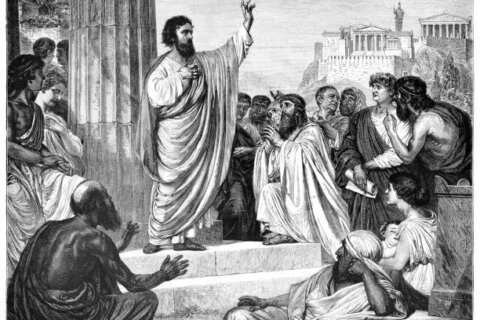Dawn came slowly, illuminating the world with the morning’s first rays. But the golden gleams could not diffuse the darkness I felt. I knew morning had come and I must face another day. But still, I nestled myself deeper into the blanket and closed my eyes, wishing I could escape reality a little longer in unconscious sleep. The familiar sound of small, scurrying feet reached the bedroom. My two-year-old had woken up. The duties of the day awaited me, but I lingered as long as I could. Every small task seemed overwhelming, every inconvenience a tremendous frustration. Engulfed by a perpetual emptiness, I longed for something I knew not how to define. Guilt assailed me as I lay awake at night, fatigued but unable to sleep. Guilt over another day lived in vain. Guilt over my inability to be the person I wished to be as I struggled through the overpowering feelings of discouragement.
DEPRESSION. Although it is experienced differently and in varying degrees, this is far from the only one who has suffered under its torment. More than 300 million people around the world suffer from depression, according to the World Health Organization. In the past years, these numbers have dramatically increased, making depression the leading cause of disability worldwide. 1 On average, a suicide occurs every 40 seconds. In fact, suicide has become the second leading cause of death among young people. 2
This world has perhaps never been more conducive to depression. Sin, the cause of humanity’s first tear, has never been as unrestrained or tolerated as it is today. We are surrounded on every side by the promotion of sin, from the classroom curricula presented to us when young to the doctor-assisted suicide offered to us when old. The devil has set up a thousand and one forms of oppression, and his envoys have faithfully ensured the bondage of the masses.
And while we wrestle with life’s hardships, Satan delights in separating us from each other. Never has humanity been more dissociated from each other. Although today’s technology has enabled us to be more plugged in and readily-connected than ever before, we are lonelier than we’ve ever been. No longer can we draw help from the village in rearing our children. Past are the days of companionship with our neighbours. ’Tis the day of disposable relationships, when it is a rarity to see a couple grow old together after the “I do’s.” A social life mainly consists of catching up via an assortment of devices and social media, where each is pressured to keep up a polished online image. And if our technological devices weren’t isolating us enough, an array of prejudices prevail that have successfully separated us from our fellow-men. And thus, we face life’s disappointments and difficulties largely bereft of the authentic friendships that would offer the support we need to overcome life’s many challenges. Is it any wonder then that so many are succumbing to depression?
Not knowing where to find help for life’s hardships, over 40 million people, 12 years and older, are turning to antidepressants in the United States alone.3 Antidepressants first became popular in the 80’s when Eli Lilly, a pharmaceutical company, developed a drug they named Prozac. The drug was originally tested as a treatment for high blood pressure, but failed to perform as hoped. Subsequently, the company planned to use the drug as an anti-obesity pill, but the drug proved unsuccessful again. When the drug was tested on those hospitalized for depression and those diagnosed with psychosis, it only made some worse. Finally, the drug was tested on five people with mild depression. When all five seemed to respond positively, the drug was widely marketed as a wonder drug to alleviate depression. So successfully was Prozac marketed, that people were requesting the drug by name the first day it launched.4 In the United States, the company reached $350 million in sales in the first year alone.
Today, Prozac is still one of the most frequently prescribed antidepressants. But the drug has failed to live up to its advertising as a safe wonder drug. People committed suicide after taking this “happiness in a pill.” A common link has been found between mass shootings and antidepressant use. Following extensive trials, the FDA admitted that drugs like Prozac increase the risk of suicide, violence, and homicide in all ages. In 2004, the FDA issued a black box warning, its strictest warning, for nine different antidepressants, of which Prozac is one. Nevertheless, antidepressant use is soaring in every country around the world. And while the masses suffer, the pharmaceutical companies rake in the dollar bills as they dispense pills that can never cure the problem.
But there is One who has always taken note of the downcast and oppressed. The Israelites had suffered under the Egyptians. Fathers had watched helplessly as their sons were ripped from their wives’ bosoms. Brides had bandaged the bleeding backs of their husbands. From generation to generation, the Israelite nation served under hard taskmasters. Many eyes had lost their sparkle. Many hearts had grown weary and melancholy under the daily oppressions.
But the day of their deliverance drew nigh. God told Moses, “I have surely seen the affliction of my people and have heard their cry.” The Lord raised Moses up to be the people’s deliverer and sent him to Pharaoh with one message: “Let my people go” (Exo. 3:7)! He, of course, had no intention of letting such profitable slaves go. But the Lord’s will was stronger than the stubbornness of Pharaoh’s heart. The Lord had seen the people’s affliction. He had determined to deliver. Pharaoh had to let His people go, even if it took plagues of frogs, hail, darkness, and death to accomplish the exodus.
The Lord’s compassions have not failed even to our day. He has taken note of Satan’s oppressions. He has heard the cry of the millions who, in their anguish and desperation, seek to find respite in the form of mind-numbing pills with an array of side effects.
The Lord has not failed to see how wickedness is being promoted and facilitated in this world, ever deepening the pain of humanity. He is not oblivious to the many ways in which governments, businesses, and kings of the earth have been exploiting this pain to make enormous profits. Not content with only taking advantage of the multitudes, they further devise oppressions that will multiply their gain.
But the day of deliverance draws nigh for the heavy-laden of our day. God has restored His church in this end-time, replete with a ministry having a message of hope and deliverance for the groaning masses. “Let my people go!” The time has come for the multitudes to join themselves to Moses and defy their oppressors. The merchants of the earth will harden their hearts and do their utmost to hold on to their subjects, but we declare to those who have waxed rich by the exploitation of man, that the time has come to let the people go. We proclaim to every soul who has become depressed under the yoke of sin, that God is a Deliverer to all who will seek Him and offers refuge to all, in His true church.
A land flowing with milk and honey awaits. A place where the bondage of sin is broken; where none fight the battles of life alone, but is joined by a host that fights as one man for every brother and sister; a land where broken hearts and broken lives find healing. In this kingdom, happiness does not come in the form of a capsule, but rather, peace and joy prevail as the natural outflow of salvation, purchased for us by the powerful blood of the Lamb!
The Lord will prevail, even if it takes plagues of death, and mourning, and famine. He is freeing people from their oppressors, spoiling them as they go. And as the merchants of the earth bewail the loss of their profits, the liberated multitude will go forth rejoicing as they shout, “Alleluia: for the Lord God omnipotent reigneth!”
Footnotes:
[1] www.who.int/news-room/factsheets/detail/depression
[2] www.who.int/mental_health/prevention/suicide/suicideprevent/en/
[3] https://www.apa.org/monitor/2017/11/numbers
[4] https://google.ca/amp/s/amp.theguardian.com/society/2007/may/13/socialcare.medicineandhealth





